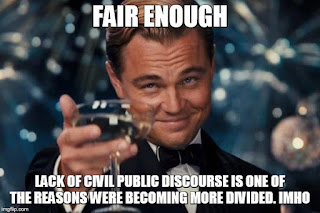Analyzing Public Discourse: Class texts synthesized
The Class Presentations are in Full Swing Now. We have talked about Public Discourse about Immigration and LGBTQ+ Rights. Beyond the topics, the public discourse projects have so far reflected a synthesis of the texts we have read throughout the semester. I think that this shows us that the texts for this class are incredibility relevant to real life now matter publication year (I'm looking at you Amusing Ourselves to Death). I am going to break down the first two presentations and look at how they reflect back on the texts we have read for this class broadly and more specific to the presentation.
We can see that as said in I'm Right and You're and Idiot page 24 Hoggan discusses the pyramid of choice with Carol Tarvis. I think this shows how or perhaps why particularly on problems of Immigration and LGBTQ+ rights the left and the right are so far apart and tend to villainize the other viewpoint. Again talking about these you can realize there is cognitive dissonance. Again talked about with Carol Tarvis. Whether it is the Obama or Trump speeches whether a news channel is using the "correct language" to refer to an individual who is transgender, from the presentations it is clear that the speeches contradict previous speeches or view of the individual and perhaps resistance to using language that is to them "incorrect". This cognitive dissonance mean you look for what confirms your view.
We saw in both presentations that the media is sensationalized. We see on the Newsmax example for the immigration Debate that the one host was shouting down the guest. This goes to show that in Amusing Ourselves To Death Neil Postman was correct in pointing out that the television encouraged us to crave entertainment over real news. This then has made it harder to find facts themselves interesting because the presentation is not entertaining enough I wanted to ask do you think it's possible to get back to where facts themselves can be seen as interesting despite presentation lacking sensationalism?

I really don't know if we can ever return to the world before "Post-Truth" became a thing. I personally love to learn and broaden my horizons (most of why I went to college in the first place). I have learned that it is really hard, or nearly impossible, to separate the information from the presentation method. The way facts are presented change the facts themselves. I did an exercise in an intro journalism class where we were given a list of bullet pointed facts of an incident, like a house fire in a town or a stabbing behind a business. Then we had to write up a blurb for that incident in different ways: a broadcast television presentation, a print headline and intro, and a tweet. Each blurb was different for each presentation method, and some information was prioritized over others depending on the form. I have since moved on from journalism because I hated it and I hated my professors, but I have kept that little nugget of info in my brain since freshman year.
ReplyDelete